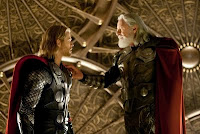
It seems if you want to be a superhero these days, you need to have some drama with your father.
The title characters in the two big superhero movies I have seen this summer, Thor and The Green Lantern, are motivated primarily by their relationships with their fathers.
This is noteworthy, because I think it is part of a larger trend in Hollywood that I started tracking when I wrote my masters thesis 4 years ago on the depiction of fathers in blockbuster movies.
In Thor, brothers Thor and Loki compete for their father Odins love and attention. Thor, the older of the two, is the rightful heir, which causes jealousy on Lokis part. Nevertheless, Odin banishes Thor from their home planet of Asgard due to his reckless behavior, which he sees as making him unfit to be king.
Without spoiling the film or going into too much detail, one of Thors primary motivators for the remainder of the film is to prove to his father that he has what it takes to follow in his fathers footsteps and be king.
In The Green Lantern, hero Hal Jordans humble beginnings include seeing his combat pilot father killed in a jet crash. Right before the horrific scene unfolds, young Hal asks his dad Are you afraid? to which his father replies, Its my job not to be.
Thus, Hal spends the first few decades of his life behaving recklessly to prove that he, too, is not afraid of anything. He also becomes a daring fighter pilot, like his father before him. In fact, the very reason he is chosen to be a Green Lantern is because he is seemingly fearless. He of course is not fearless, but is successful in his superhero endeavors because he has a certain humanity, provided by his stark memories of his father, that allow him to overcome his fear.
I enjoyed both films, although they certainly had their flaws. The strong fatherhood themes made them interesting enough for fun summer entertainment. The fact that I saw both films in stunning Real 3D had, of course, nothing to do with my enjoyment of them.
The question I have for our readers is this: What do you think it means that the writers of these stories (which of course got their start as comic books many years ago) decided that the most compelling motivators for these superheroes were their relationships with their fathers?